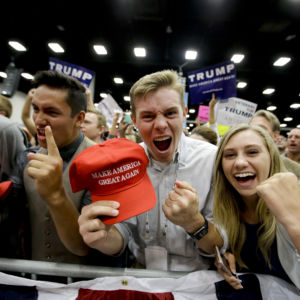The coronavirus is “a good thing” the president said. He doesn’t like shaking hands with “disgusting” supporters.”
That’s what Olivia Troye, the most recent former member of the Trump administration to turn on him, reported. That shouldn’t come as a surprise. The president’s deep-felt identity rests on his wealth and superior status, the very opposite of most of his adoring supporters.
His has always been a message of the super wealthy looking contemptuously down.
Yet Trump’s appeal is based on class. An alluring apple hung in front of those fearful of further loss of their perceived place in the class hierarchy. “Make American Great Again” is a call to those struggling to reclaim that place.
Trump’s been called a clown, an idiot, incompetent, unfit for the job. Nevertheless, he has a solid base of voting Americans who don’t seem to care. In fact, most relish that their enemies belittle their president. They treasure the fact that those they consider responsible for their dismay are irritated.
The president’s response to a question from interviewer Chris Wallace, “How will you regard your years as president of the United States?” is a good illustration of another connection the president has with his voters, through his sense of martyrdom.
This question from Wallace that virtually all other presidents would see as an opportunity to expound on their accomplishments, was treated dynamically differently by this president. His response was classic victimhood. “I think I was very unfairly treated.” Being unfairly treated is at the heart of what Trump and his supporters ooze.
Watching a Trump rally is seeing those who feel their county has left them behind, different from their imagined picture of when they were in charge, with white rule, families consisting of straight men and devoted wives and a middle class enjoying financial security.
They see Donald Trump defending their dream of what should be, no matter if he is packaged in tarnished wrapping.
If anything, the devotion of Trump’s supporters appears more intense now than in 2016.
The news, with its highlighting of Black Lives Matter, the tearing down of monuments, the ever-increasing visual presence of people of color on the media and in places of power, are reminders that their vision is being eroded. They feel the United States marching toward the non-white majority projected by 2045.
The anger, disgust and fear of outsiders felt by Trump supporters and harnessed by the president fits comfortably with his Nationalist creed. “America First” is built on vilifying immigrants and other countries not of his liking. This, too, aligns with those who feel their country is leaving them.
In a recent Pew poll, just 32 percent of Trump supporters felt that the growing number of newcomers strengthens American society. The same poll reported only 5 percent of Trump supporters believe that “White people have a great deal of unfair advantages over people of color.” If anything Trump’s supporters feel people of color are receiving too much advantage, at a cost to whites.
There has been much coverage of the adoration of Trump supporters, but too little of their anger, and even less of the pleasure evident at his rallies, what Trump himself has described as “fun.” His raucous rallies are Americans feeling a kinship with other, overwhelmingly white, Americans who feel left behind.
They are in a safe place, pleasurably yelling their disgust and anger over continuing changes in their country.
They are given permission to use language offensive to their Democratic opposition by Trump’s often crude words. Their high energy eruptions deepens their tribal bond, gives enormous enjoyment to their obsessively praise seeking president, and allows all accusations of his misconduct to be excused as partisan trash talk.
On first glance, the adoration of roughly 40 percent of Americans to billionaire President Donald Trump seems incongruous.
If seen through the eyes of his niece, Mary Trump, or former Pence Aide, Olivia Troye, or the endless cadre of individuals up-close to the personal Trump, the president is a narcissist using those vulnerable for his own gain. In countless disclosures from behind the façade, Donald Trump actually dislikes the very people who scream his praise.
He may not like them, but they certainly fit his needs. And he fits theirs.

